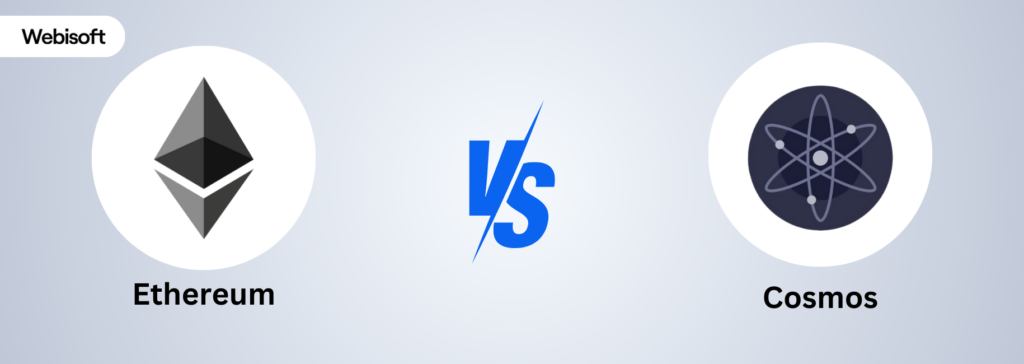Ethereum and Cosmos are two prominent platforms in the world of blockchain. For blockchain development, both of them have different pros and cons.
Now, the confusion arises when you’ve to choose between Ethereum vs. Cosmos.
Well, Ethereum is known for its smart contract capabilities and extensive developer community. On the other hand, Cosmos is a network of blockchains designed for customization that comes at a lower cost.
However, Both platforms have the potential to transform e-commerce through blockchain technology, but their approaches differ.
Anyway, choosing between Ethereum and Cosmos depends on your specific e-commerce needs. You can decide by going through this guide on Ethereum VS. Cosmos.
In today’s guide we will explore all the detailed differences between Ethereum and Cosmos. Thus, keep going!
Contents
What is Ethereum?
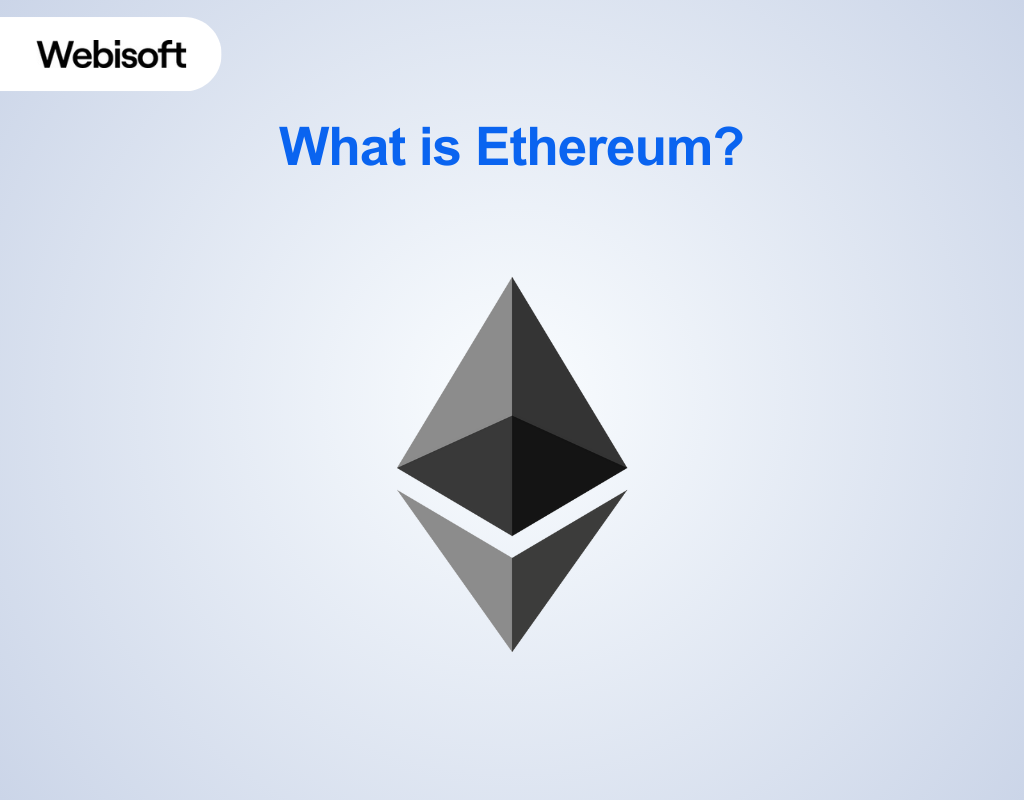
Ethereum is a digital platform that lets people use a technology called blockchain. It’s special because it allows for smart contracts, which are like automatic agreements that do something when certain conditions are met.
However, Ethereum also lets people create and use applications that don’t depend on any central authority, thanks to its own digital currency, Ether. This means Ethereum can do more than just send and receive money. It can run these agreements and apps securely and without a middleman.
Pros and Cons of Ethereum
Ethereum changes the game in blockchain with its strong safety features and the ability to run complex programs. But, it has issues like being slow when lots of people use it and high costs for making transactions.
In summary, Ethereum has good and bad points to consider:
| Pros | Cons |
| Highly Secure | Slower Transaction Speeds Compared to Some Newer Blockchains |
| Supports Smart Contracts and dApps | Higher Gas Fees During Network Congestion |
| Large and Active Development Community | Energy Consumption Concerns (Pre-Ethereum 2.0) |
| Continuous Innovation and Upgrades | |
| Decentralized Finance (DeFi) Integration | |
| High Market Capitalization |
What is Cosmos?
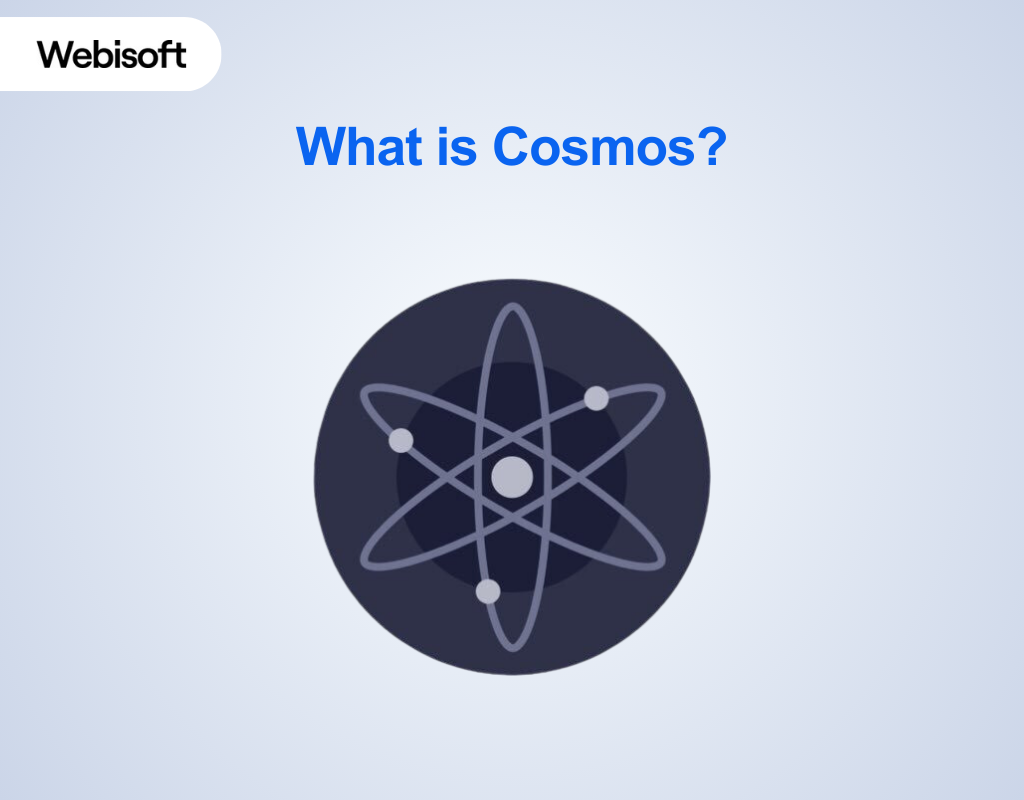
Cosmos stands out as a network that lets different blockchains work independently yet efficiently together. It uses a system called Byzantine Fault Tolerance (BFT) to make decisions.
Moreover, it’s known as the “Internet of Blockchains”. Iit lets these independent blockchains share information while keeping their independence.
The main aim of Cosmos is to tackle big issues in blockchain, such as making it faster and easier to use. By allowing different blockchains to easily connect, Cosmos aims to improve the blockchain world’s efficiency and ability to scale up.
Pros and Cons of Cosmos
Cosmos takes a fresh look at blockchain. It emphasizes how different systems can work together and scale up. Moreover, it’s made to make building blockchains easier and to help them talk to each other better.
However, there are challenges, like its complex setup and the need for more blockchains to join this interconnected network. Below, we’ll explore the pros and cons of Cosmos, giving you a clear picture of what it offers:
| Pros | Cons |
| Interoperability Between Blockchains | Relatively New and Less Proven Than Older Blockchains |
| High Scalability and Efficiency | Complexity in Blockchain Interactions |
| Strong Focus on Usability and Developer Experience | Limited Network Size Compared to More Established Blockchains |
| Customizable Blockchain Frameworks | |
| Strong Security with Byzantine Fault Tolerance | |
| Decentralized and Sovereign Blockchains |
Ethereum vs. Cosmos: The Similarities
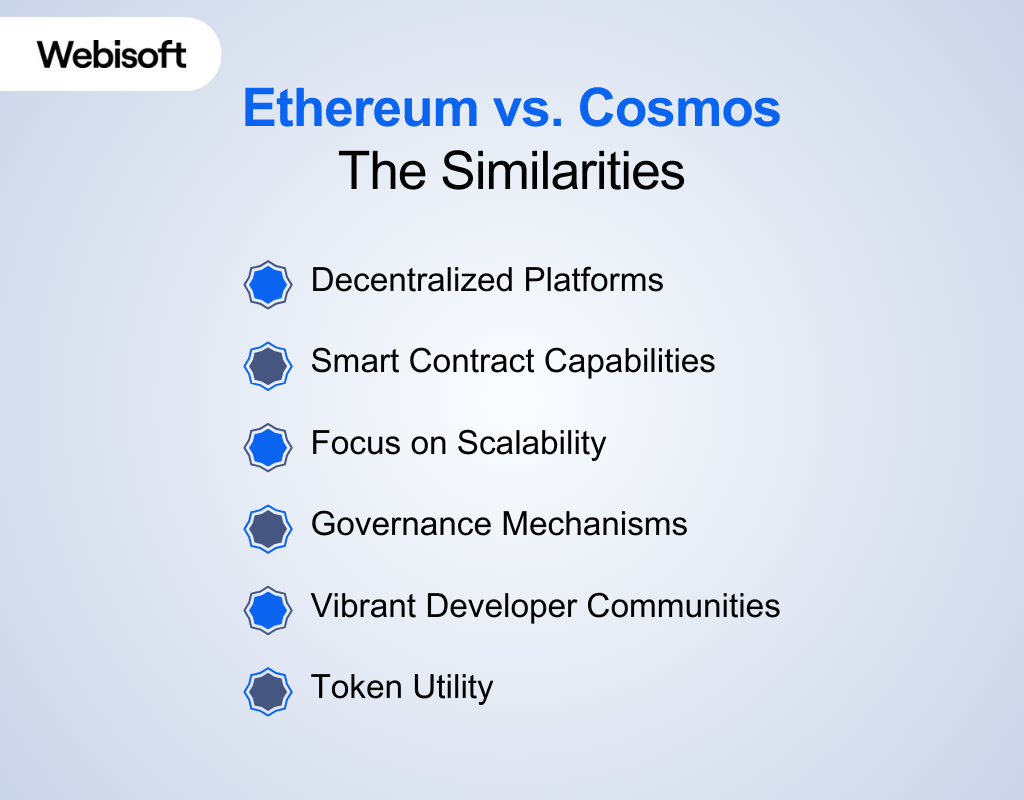
Let’s explore how Cosmos (ATOM) and Ethereum (ETH) are similar:
Decentralized Platforms
First off, both are decentralized. Thus there’s no single control point. They run on networks of computers. This setup increases security and openness.
Smart Contract Capabilities
They both handle smart contracts, which are agreements coded directly into the blockchain. Ethereum introduced this concept, and Cosmos supports it too. It makes both appealing for building decentralized apps.
Focus on Scalability
Scalability is a big deal in blockchain. Ethereum and Cosmos are tackling this by upgrading and allowing blockchains to work together. Thus they’re working to handle more transactions smoothly.
Governance Mechanisms
Ethereum and Cosmos both have governance systems letting users propose and vote on changes. This democratic approach ensures the community’s voice is heard in network updates.
Vibrant Developer Communities
The success of these platforms relies heavily on their developer communities. These groups are essential for innovation, creating new features, and fixing bugs.
Token Utility
Finally, both use native tokens (ETH and ATOM) for things like paying fees and governance. These tokens are more than just currency. They’re key to each network’s operation.
Cosmos (ATOM) vs Ethereum (ETH): The Differences
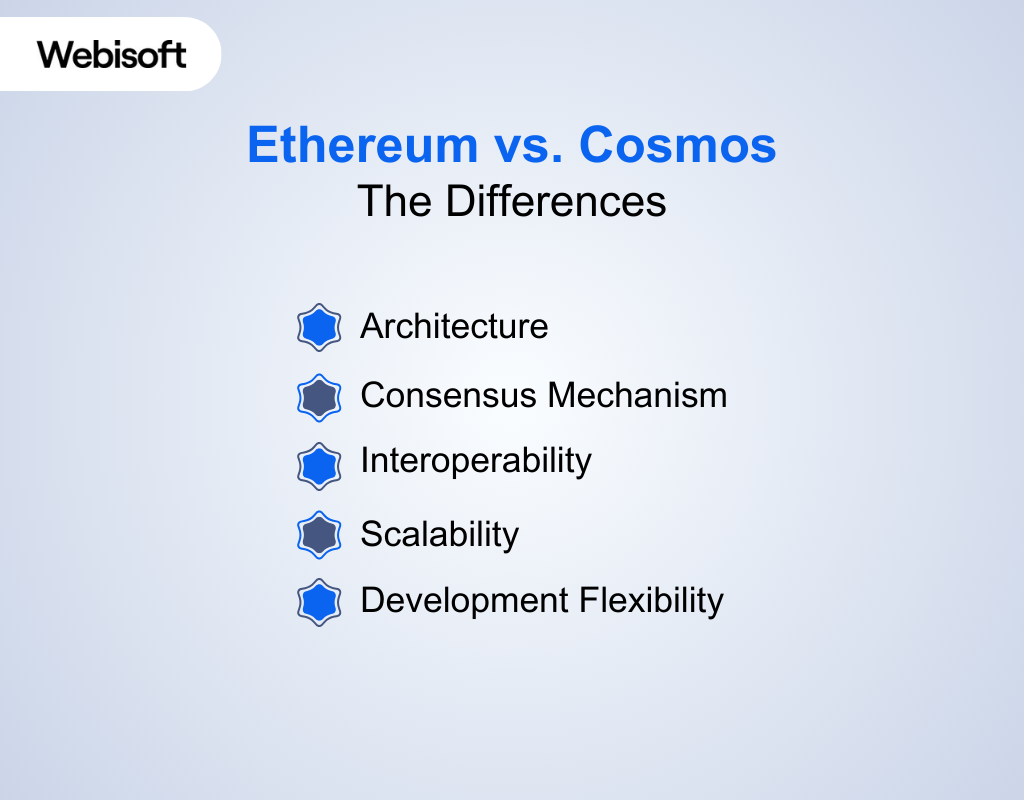
Let’s break down the key differences between Cosmos and Ethereum in a clear and direct way:
| Aspect | Ethereum | Cosmos |
| Architecture | Single blockchain with smart contract functionality. | Network of independent blockchains connected through the IBC protocol. |
| Consensus Mechanism | Currently uses Proof of Work, transitioning to Proof of Stake. | Uses Byzantine Fault Tolerance mechanisms. |
| Interoperability | Limited; relies on third-party solutions for cross-chain interaction. | High; designed for blockchain interoperability. |
| Scalability | Faces scalability issues, which are being addressed in Ethereum 2.0. | High scalability through interconnected blockchains. |
| Development Flexibility | Smart contracts provide flexibility but within Ethereum’s ecosystem. | Highly flexible, allowing for the creation of customized blockchains. |
Now, let’s explore the above differences in more detail:
Architecture
Ethereum is built as a single blockchain, known for its smart contracts that changed the game. It has one network for all its transactions and contracts.
Cosmos, however, is a network of independent blockchains. Each chain can have its own rules but still talk to others via the Inter-Blockchain Communication (IBC) protocol.
Consensus Mechanism
Ethereum uses Proof of Work (PoW) but is moving to Proof of Stake (PoS) to be more energy-efficient and scalable. On the contrary, Cosmos uses Byzantine Fault Tolerance (BFT). It is a faster and less energy-hungry way to reach agreement.
Interoperability
Ethereum’s ability to work with other blockchains is limited and needs extra tools. On the other hand, Cosmos is built for blockchains to easily connect and share data. Thus it has become a leader in linking different blockchain systems.
Scalability
Ethereum struggles with handling lots of transactions, leading to high fees and slow processing. Its next update, Ethereum 2.0, aims to fix this.
However, Cosmos, with its design of many chains working together. It naturally handles more transactions without slowing down.
Development Flexibility
Ethereum allows for a lot of creativity with smart contracts but within its own system. On the other hand, Cosmos offers developers the chance to build their own blockchains with custom rules. It gives them more freedom to meet diverse needs.
Final Decision: Which One Should You Go Between Cosmos Vs. Ethereum
Deciding between Cosmos and Ethereum depends on what your project needs. Let’s check when you should choose which one:
Choose Ethereum If
Go for Ethereum if your project needs a strong, established network. It’s great for decentralized apps (dApps) because it was the first to use smart contracts.
If your project involves complicated smart contracts, like those used in decentralized finance (DeFi), Ethereum is a solid pick. It has a large developer community and lots of resources, making it a mature choice. For security, Ethereum’s long history makes it trustworthy.
Choose Cosmos If
Pick Cosmos if your project needs to handle lots of transactions or work with multiple blockchains. It’s ideal for creating a custom blockchain or if you need specific rules and features.
Since Cosmos doesn’t depend on one main chain, it’s more flexible for designing and running your blockchain.
If you’re aiming to build a network of connected blockchains that can easily share information and value, Cosmos is designed for this. So, iIt’s the best option for projects that want to create a complex ecosystem of blockchains.
Is There Any Better Alternative to Ethereum And Cosmos?
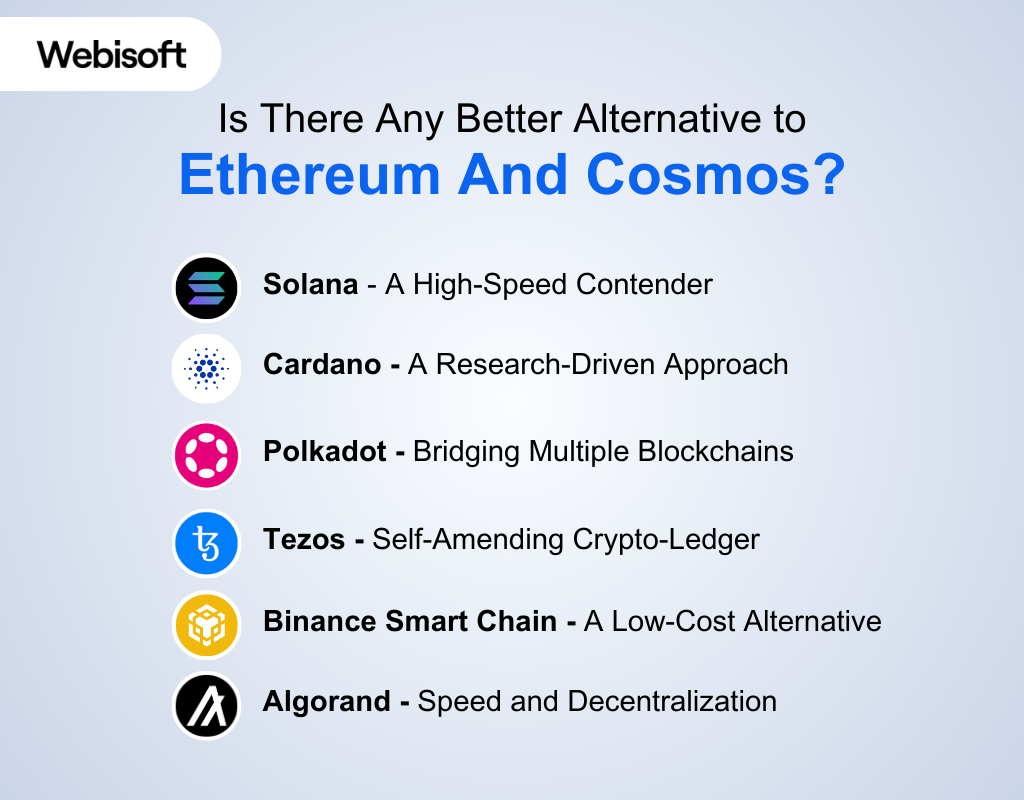
When looking into blockchain technology, it’s clear that Ethereum and Cosmos aren’t the only options. There are other blockchains out there, each with its own strengths. Here’s a quick overview of some strong alternatives:
Solana – A High-Speed Contender
Solana is known for its speed. It can handle thousands of transactions per second. Thus, it becomes perfect for fast-paced applications. Its low fees are also attractive, especially for those looking to invest small amounts.
Cardano – A Research-Driven Approach
Cardano stands out because it’s built on thorough academic research, aiming for a sustainable and scalable system. It offers secure and transparent transactions and takes a careful, step-by-step approach to development.
Polkadot – Bridging Multiple Blockchains
Polkadot offers a unique feature: interoperability between different blockchains. It allows various networks to communicate and share information. This connectivity makes it a versatile choice for complex applications. It’s ideal for projects that require collaboration across multiple blockchain platforms, especially when discussing polkadot vs cosmos differences.
Tezos – Self-Amending Crypto-Ledger
Tezos focuses on on-chain governance to avoid hard forks. Its self-amending ledger lets the network upgrade without splitting. This approach ensures long-term stability and security. However, Tezos is a smart choice for those valuing consistency and gradual improvements.
Binance Smart Chain – A Low-Cost Alternative
Binance Smart Chain is well-known for its low transaction costs. It’s compatible with Ethereum, making it easy for developers to migrate projects. Moreover, its high throughput and supportive community attract many users. This platform is a great option for budget-conscious blockchain enthusiasts.
Algorand – Speed and Decentralization
Algorand shines with its quick processing and decentralized nature. It’s designed to support a high volume of transactions securely and inclusively. Moreover, it is appealing to both big organizations and individual users.
However, to compare the above platforms effectively, go through the table below:
| Feature/Platform | Solana | Cardano | Polkadot | Tezos | Binance Smart Chain | Algorand |
| Consensus Mechanism | PoH/PoS | Ouroboros PoS | Nominated PoS | Liquid PoS | PoSA | Pure PoS |
| Transaction Speed | High | Moderate | High | Moderate | High | High |
| Scalability | Excellent | Good | Excellent | Good | Excellent | Excellent |
| Smart Contract Support | Extensive | Extensive | Extensive | Extensive | Extensive | Extensive |
| Development Activity | High | High | High | Moderate | High | High |
| Decentralization | Moderate | High | High | High | Moderate | High |
| Security | High | High | High | High | High | High |
Final Note
To wrap things up, Ethereum is a solid choice for e-commerce projects that prioritize security and stability. On the other hand, if your goal is rapid growth and cost efficiency, Cosmos’s scalability features might be more appealing.
However, both platforms offer unique benefits to e-commerce through blockchain technology, but they do it in different ways. Your decision should depend on what your business specifically needs, how comfortable you are with technology, and your future growth plans.
So, thinking about adding blockchain to your e-commerce? You can get an Ethereum or Cosmos developer from Webisoft. Get in touch with us for expert advice on Ethereum vs. Cosmos.
FAQs
How does the performance of Cosmos Vs Ethereum compare?
Cosmos often has the edge in scalability and transaction speed thanks to its inter-blockchain communication. Ethereum, while slower now, is expected to increase its performance with the upcoming Ethereum 2.0 upgrades.
In the Ethereum Vs. Cosmos dilemma: which is more user-friendly for developers?
Ethereum tends to be easier for developers because of its well-established ecosystem and comprehensive resources. On the other hand, Cosmos, although it’s becoming more popular, might require a deeper technical understanding for managing cross-chain activities.
Can Ethereum and Cosmos be used together in a project?
Yes, combining Ethereum’s strong smart contracts with Cosmos’s interoperability offers a more versatile solution for projects.
How does Webisoft assist in taking the Ethereum Vs Cosmos decision?
Webisoft offers expert advice and technical support to help you grasp the differences between Ethereum and Cosmos. We ensure you make the best choice for your project’s specific needs.
